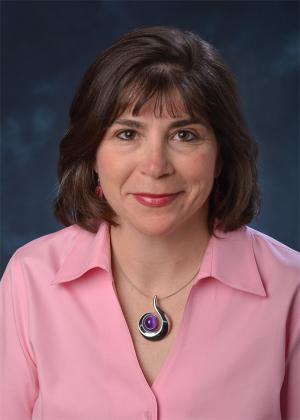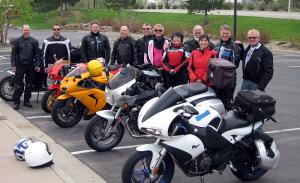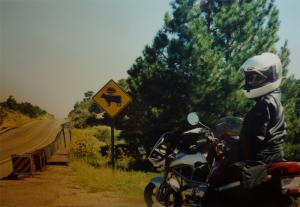Five questions for Denise Thomas

Denise Thomas has never had a job she didn’t like.
“If you enjoy it and have fun, the work doesn’t matter,” she said. “I need some challenges to keep growing and some freedom to think out of the box and that works for me.”
Throughout her career in the biotech industry – and her time at the University of Colorado Boulder as manager of building operations for the Chemistry and Biochemistry Department – Thomas has conquered a variety of challenges, all while having fun.
Her degrees – a bachelor of science in biology (microbology emphasis), a bachelor’s in chemistry and a master’s in business administration in technology management – have led her to work in several companies over an 18-year span. When the last firm she worked for closed its doors, she applied and was hired for the job at CU in 2009.
She previously had connections to the university, including during her senior year, when she worked in a microbiology and immunology lab at the then-Health Sciences Center. The biotech companies she worked for also had links to CU.
“I’ve always had an interest in sciences, and I actually thought about being a doctor, but the biology degree really opened my eyes to other things,” she said. “I decided to do research, and at one of the companies, Ribozyme Pharmaceuticals Inc., I began doing a lot of operations support duties, setting up labs, purchasing, shipping/receiving, media prep, GMP compliance and safety. As opportunities presented themselves I sort of fell into the facilities and safety role within the company.”
Along with managing facilities, Thomas also previously worked as a safety officer and continues that role with her involvement in environmental health and safety management for the department, working closely with the campus EH&S department at CU. “We always want to see how we can best support the researcher through safe practices and procedures.”
This year, she was voted in as chair of the University of Colorado Staff Council, a governance group that works closely with constituents to represent their interests to the administration.
1. What are some of the projects you’ve been involved with since you’ve been at CU?
Our department had a lot of renovations going on when I got here. Our biochemistry division was going to move into a new building, the Jennie Smoly Caruthers Biotechnology Building on East Campus, so there were a lot of project management pieces to this position. Although I had some experience in project management in the past, this was the first time I got to work on a construction project from start to finish. We had an incredible team that worked diligently on getting all the logistical pieces together to move the biochemistry division. We moved 17 faculty members and their labs into the new building in 2012. It was really fun and interesting, being able to help support the faculty through it all so they can continue doing their science.
I love the creative process that’s involved. We had a lot of new scientists here and even though they were renovating their lab spaces, they didn’t know a lot about how to design a lab space or what kind of infrastructure would be best to make the space work. I was able to help guide that process with the architect and construction workers to build a space that functioned well for the scientist.
More recently, I was part of the renovation of our organic chemistry teaching labs. The funding measure for the project had passed the state legislature, however the funding never came through to the university. Kelly Fox, our senior vice chancellor and CFO, came up with an internal funding model and 12 years after the process was started the project finally took flight in 2012. It was completed a year ago and is amazing. The students say it is like night and day from our old chemistry labs. The renovation allows the students to do science that they weren’t able to do before.
We’re also keeping the conversation going about building a new chemistry building since the one we’re in – Cristol – was built in 1958. The current infrastructure is limiting within the building and makes it hard to expand and grow, while trying to meet the scientists’ needs. We would also like to have the general chemistry labs in Ekeley renovated since they were not a part of the original scope organic teaching lab project. Renovations there would allow those spaces to also become more modernized.
2. What was your previous experience with CU governance groups?
I joined the Boulder Staff Council three-and-a-half years ago, so I’m in the beginning of my second term this year. I had never been a part of a governing group before, but I was at a crossroads. I had been employed at CU for three years and I didn’t know if I wanted to stay; there’s always the lure of biotech out there. When I knew that I would stay, I also knew that I wanted to be part of and contribute to the community.
The Boulder Staff Council was asking for nominations and my colleagues nominated me. The next thing I knew, I was on the council and thoroughly enjoying it. It was Interesting to be able to hear more about what was going on at the campus level because that news doesn’t always get back to the department. Then the University of Colorado Staff Council (UCSC) needed a representative from the Boulder campus and I volunteered.
3. As president of UCSC, what are your goals for the coming year?
One of the things I want to focus on is that we need to come together as one unified council. We have members from the other campus councils feeding into UCSC and we want to make sure that we are all on the same page. We need to do that to be a driving force to help bring forward what needs to be brought forward to the administration. It’s really important that we are united and work together.
We also need more bi-directional communications. I’d really like to see the campus councils take initiative to get to the front-line people – the people at the top – who know what is happening, especially concerning the initiatives that are being discussed or implemented. In UCSC’s May meeting, we had a lot of momentum going and I want to continue that. We want to work on the things that matter and focus our energy on making sure our constituents are being well-represented.
4. What are UCSC’s specific goals or agenda items for the year?
Professional development is still on our radar from last year and we will continue to try to figure out the availabilities of programs and opportunities for staff members. We have a committee that’s working on that, to determine not only what is missing, but to try to develop some consistency across the campuses. We want to be able to influence the variety of opportunities and standardize them for everyone, no matter the campus.
Administrators want to make sure that the university is one enterprise. We keep hearing that, but in the past, everything was separate. So it’s important that we all work together to make the idea of “one university” happen here.
UCCS’s policy committee will continue to review policies that are being presented. We also want to continue to keep the conversation going around an anti-bullying policy. We’ll do whatever we need to do to help assist that process forward.
Another big push is for diversity and inclusion. We don’t have any specific plans yet since we are still waiting for direction from the administration or the Board of Regents, but that will be on our agenda for the coming year.
5. Away from work, how do you have fun?

My husband and I travel by riding our motorcycles with a group of people. We take short, weekend trips and some longer trips. That’s our way of getting out of town and enjoying things; we’ve been doing it for years.

We ride around Colorado and northern New Mexico mostly. We did a 5,000-mile trip a few years ago to Canada and Alaska. We have a friend who lives in England and every time he and his wife visit, we try to do a bigger excursion. My husband likes to push the mileage, and what would normally take a few hours winds up being an all-day trip. We like to have some perks at the end of the day, so we stay in hotels or try to find a hot springs. One place we like to go is Lake City. There’s not a lot there except for a French chef named Bruno. We stay at his place and have him cook dinner. That’s a really great time.
I love hiking and the outdoors, too, and I’m heavily involved with my church where I’m a certified practitioner and work with our bereavement team and as a teaching assistant.

